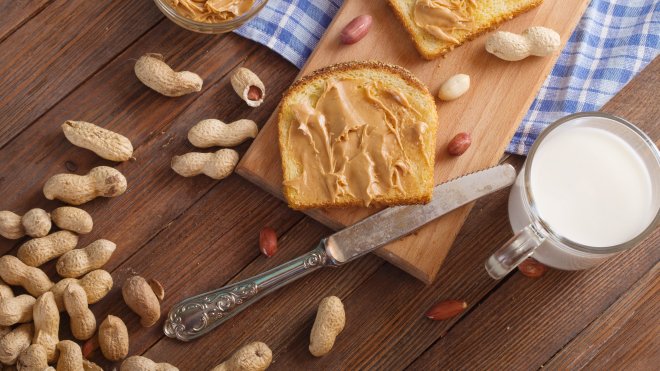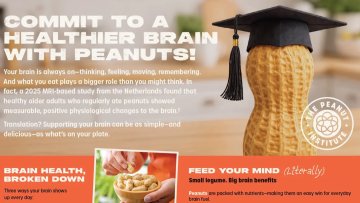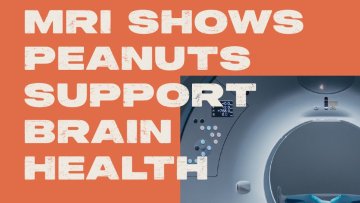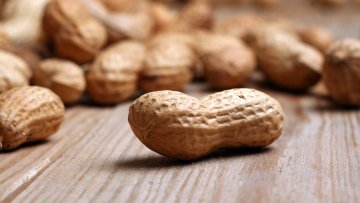It’s late afternoon, your coffee’s wearing off, and you just need a little pick-me-up to make it through quitting time. Sound familiar? Well, you aren’t alone—because it’s reported that 95% of adults and 93% of kids eat at least one snack a day. And while it may be tempting to grab a quick bag of chips or a sugary soda, the short-term energy boost they provide will be completely erased by the crash that inevitably follows.
But good news—there’s a better way. In fact, when used correctly, small snacks can help keep you energized from sun up to sundown—all without leaving you feeling run down. And the secret ingredient? Natural, protein-packed whole foods—like peanuts.
How to Snack Smart
As there’s no true definition of what a “snack” is—for some people it may be fruit slices, while others may grab a bowl of ice cream—we’ll look to the ultimate source: the Dietary Guidelines for Americans 2020-2025. It recommends nutrient-dense snacks, like raw veggies, plain yogurt, fresh fruit, and nuts (like peanuts).
Benefits of Smart Snacking
According to the Harvard T.H. Chan School of Public Health, small snacks throughout the day can lead to some big benefits—including:
- More Energy: If it’s been hours since your last meal, a quick, small snack can help give your glucose levels a boost.
- Preventing Overeating: If you curb your appetite with a few small bites, it can prevent overdoing it at the dinner table.
- Extra Nutrients: With smart choices like peanuts or raw veggies, you can get a wider variety of nutrients your body needs.
Why Peanuts Should Be Your On-the-Go Go-To
If you’re looking for a nutrient-dense, protein-packed option that can deliver big benefits for your health and happiness, peanuts and peanut butter can do it all—and all in as little as one daily serving:
- All-Day Fuel: Because of their unique mix of plant-based protein, fiber and health fats, your body can use peanuts to help you power through your day—especially if you pair it with other healthy foods, like peanut butter on multigrain toast.
- Stress Less, Remember More: A study found daily peanut or peanut butter consumption was associated with improved memory, decreased anxiety and depression, and lower stress. (Plus, peanuts contain vitamins and minerals that support your brain in other ways.)
- Support Long-Term Health: Eating peanuts has also been associated with a 21% reduced risk of premature death, and a 24% lower risk of death from heart disease.
- Reduce Cancer Risk: Including colorectal, gastric, pancreatic and lung cancers.
- Improve Weight Management: A considerable amount of evidence shows incorporating peanuts and peanut butter into your diet may help with weight loss—and it may even support your journey if you’re taking a GLP-1 medication. (And you can check out our simple, GLP-1-ready recipes right here.)
A Snack that Gives Back, in More Ways than One.
Even beyond the functional health benefits of peanuts and peanut butter, there are plenty of other ways this little snack gives back.
- Versatile: Peanuts and peanut butter are used in entrees, snacks, dips and more all around the world. Even if you’re gluten-free or need something diabetes-friendly—so you’ll never run out of ways to mix it up.
- Affordable: Dollar for dollar, peanuts deliver more protein at a lower cost than any other source—including animal protein, dairy and other nuts.
- Sustainable: Another benefit of peanuts? They have a lower environmental impact than meat, dairy, or even almonds. Plus, peanuts renew their soil by enriching it with nitrogen.
Your Snack-Sized Summary
With a little discipline and planning, eating small, nutrient-dense snacks can give back in some pretty amazing ways—whether it’s a healthier, longer life, a little extra room in your budget, or a cleaner planet. And few foods are as equipped to deliver those benefits (along with a satisfyingly focused dose of plant-based protein and nutrients) as peanuts.
We don’t know about you, but all this snack talk has gotten us pretty hungry—so why not check out our super-simple snack recipes, and start your own healthy habit today?
Source: The Peanut Institute Scoop – October 21, 2025




